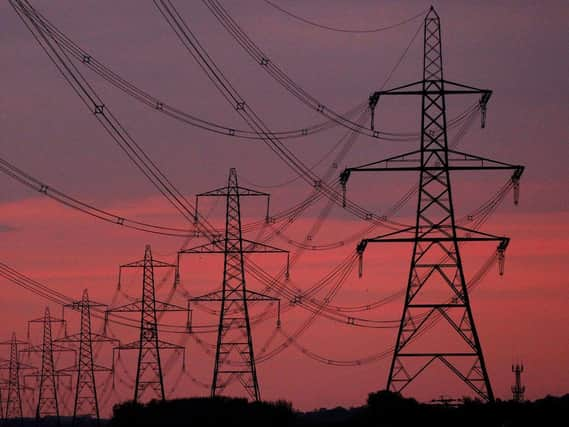Welcome crackdown on brokers who overcharge business for energy - Gerald Krasner


Hotels, pubs and sports clubs have all faced an uncertain future with bills racking up and income disappearing.
Energy bills are one of those huge outgoings that have caused financial worry for many companies.
Advertisement
Hide AdAdvertisement
Hide AdSo imagine what it is like to discover there are hidden charges in your monthly bill.


That has been the reality for hundreds of thousands of firms.
The consumer energy market is tightly regulated, but those same protections aren’t available in the corporate sector.
And many companies use brokers to secure them a deal.
What many don’t realise is that commission is often added on top of the supplier’s base price.
So while around two-thirds of the annual £25billion cost of corporate gas and electricity deals in the UK are bought through brokers, it is estimated that over 90 per cent of businesses may have been mis-sold their energy contracts - with hidden fees which can leave firms out of pocket.
This has been going on for decades, and it can be catastrophic for small businesses, particularly when they have had to shut down due to the pandemic.
Fortunately, action is now being taken.
Energy regulator Ofgem has unveiled plans to crack down on brokers who have overcharged businesses for their energy by hiding inflated commission charges.
Philippa Pickford, a director at Ofgem, rightly said getting a better and fairer energy deal is ‘more important than ever as microbusinesses emerge from the challenges posed by the Covid-19 pandemic’.
So there is hope on the horizon, but we’re not there yet.
Advertisement
Hide AdAdvertisement
Hide AdCitizens Advice has estimated that around 1.5 million UK businesses face a greater risk of having their energy supply disconnected than the average household.
That’s because while a supplier must exhaust all other options before disconnecting a domestic customer who falls behind on their bills, that protection doesn’t apply for small businesses.
Firms therefore find themselves paying more than they expected and at greater risk of being cut off.
In response to this unfair system, a group of energy professionals have come together to form PanoServe to uncover the true extent of the problem.
We know that energy firms have already had to pay out £389million in fines and redress payments over the last ten years – 25 per cent to the Treasury and 75 per cent in redress payments – but this is just the tip of the iceberg.
There are certainly brokers who do a great job by correctly reviewing the market and describing the options accurately while demonstrating transparency over their fees with their clients.
But not all.
After reviewing dozens of contracts, we have already unearthed millions of pounds of mis-selling.
By sector, the average claim value is £240,000 among engineering firms, £160,000 in education organisations, £120,000 in sporting clubs, and £80,000 among hospitality companies.
Advertisement
Hide AdAdvertisement
Hide AdThese are huge sums which can make a massive difference to a company’s future, with a knock-on impact on jobs and the economy.
We’ve set out to not only help firms get out of overpriced contracts, but we’re also helping companies decarbonise in the process.
UK industry has around 15 years to reduce carbon consumption and use by two thirds so that we can achieve Net Zero by 2050.
In Scotland, ambitions are even greater.
With COP26 coming to Glasgow later this year, the collective effort to save our planet for generations to come cannot simply be left to government and the public sector.
Private companies must do their bit too, and there are 100 per cent green energy options which should be considered by firms.
Companies should be encouraged to move to contracts which eliminate fossil fuels, review their carbon footprint, develop a carbon management plan and even explore onsite renewable generation and storage.
And one of the key aims should be for businesses to reduce their energy costs.
This can be achieved through an audit of lighting, heating and air conditioning, introducing LED lighting and controls, and battery storage systems which enable energy from renewables to be stored and then released when power is needed most.
Advertisement
Hide AdAdvertisement
Hide AdAs well as helping the UK’s journey to Net Zero, this will also save firms money in the future.
But at the same time, they should be compensated if they have been mis-sold over the past decade.
One company which we found had been mis-sold around £100,000 in energy contracts was Winn Solicitors in Newcastle.
As a result, we’ve now set up a joint partnership with the legal firm to get justice for all those companies which have suffered.
Sixteen cases to recover hidden commissions are ready to go to court.
For years, the PPI claims market saw financial institutions forced to provide compensation for mis-selling, and now it’s the turn of the business energy market.
Claim values of around £10million have so far been identified, and there is the possibility of class action in the years ahead.
We’re determined to help firms get money back, so we’ve established a guarantee of a minimum 50 per cent of compensation from any pay-outs.
Advertisement
Hide AdAdvertisement
Hide AdThis claims market could be even more significant than what we witnessed with PPI.
Businesses have nothing to lose and everything to gain.
Complex contracts and bills need to be simplified, hidden charges and costs need to be made transparent, and temporary fixes need to be made sustainable.
It’s vital that businesses fully understand their energy profile, costs, consumption, and carbon reduction so that we can all live in a greener, cleaner world together.
Gerald Krasner is director of energy management company PanoServe.
Comments
Want to join the conversation? Please or to comment on this article.